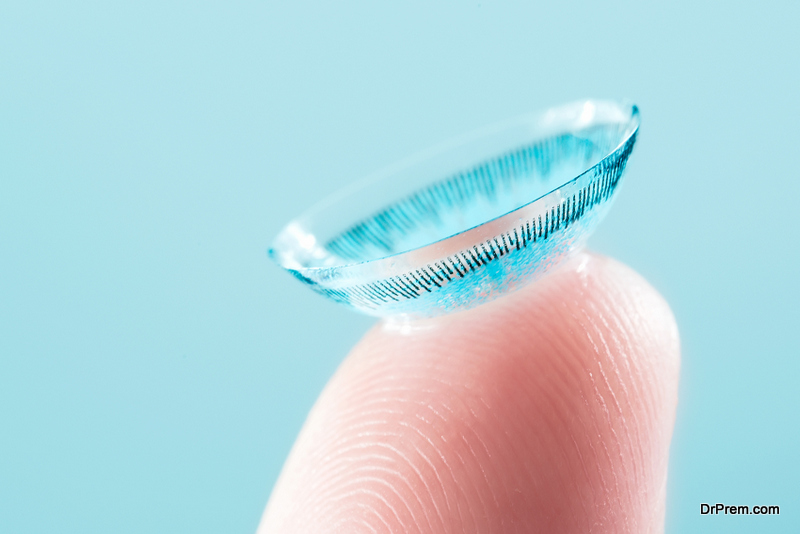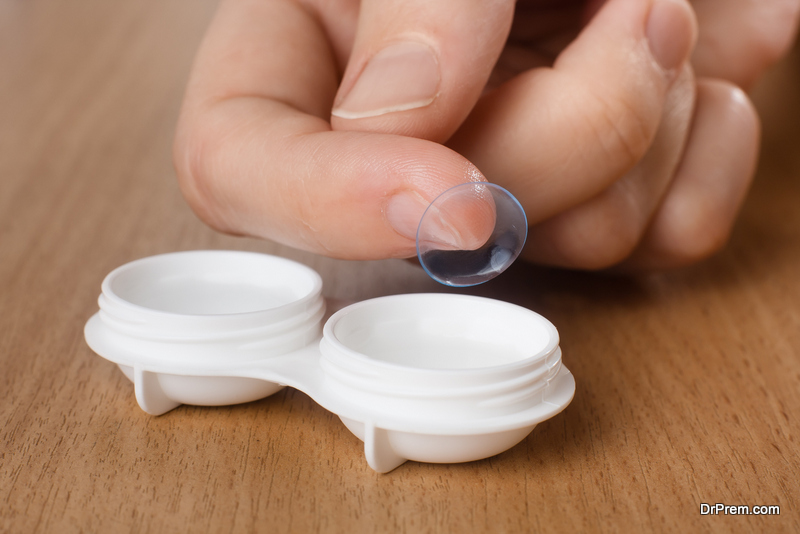Contact lenses have been revolutionary for those with poor vision who want an alternative to wearing glasses. Currently, more than 45 million people in the United States wear them on a regular basis. They’re a normal part of daily life for millions of us, and we don’t tend to think much about them, but what kind of impact do they have on the environment?
The Environmental Costs of Contact Lenses
 Most contact lenses these days are disposable for the convenience of the wearer, and made of plastic. As you might imagine, that already poses some level of environmental hazard, since plastic is not biodegradable, and disposable goods tend to produce much more waste than their non-disposable counterparts. The majority of contact lenses would hypothetically end up in a landfill somewhere, taking up space and taking forever to fully break down.
Most contact lenses these days are disposable for the convenience of the wearer, and made of plastic. As you might imagine, that already poses some level of environmental hazard, since plastic is not biodegradable, and disposable goods tend to produce much more waste than their non-disposable counterparts. The majority of contact lenses would hypothetically end up in a landfill somewhere, taking up space and taking forever to fully break down.
One scientific study found that there may be an even bigger problem with contact lens disposal; between 15 and 20 percent of contact wearers are flushing their disposable lenses down the toilet, or sending them down the sink. As a result, somewhere between 6 and 10 metric tons of plastic lenses end up in wastewater every year. Because these lenses tend to be denser than water, they end up at the bottom of lakes, oceans, and rivers, and could pose a major hazard to aquatic life—particularly the bottom feeders that could accidentally ingest these bits of plastic.
The problem is difficult to accurately calculate because contact lenses are clear, small, and numerous, making it difficult to tell just how many have accumulated. Contact lenses may also break down from a macroscopic perspective, resulting in the generation of microplastics that inevitably work their way into the food chain. Microplastics are, of course, an increasing concern among environmentalists. Get yourself a perfect pair, for better clarity and if you are looking for new contact lenses , check contactlensesplus.com.
Alternatives to Contact Lenses
If you’re looking to live a greener, more environmentally friendly lifestyle, you may consider trying to find a contact lens alternative. Obviously, you’ll want a solution that still allows you to see, but these methods may give you the best of both worlds:
1. LASIK eye surgery:
 First, you could consider getting LASIK eye surgery, or a related procedure intended to correct your eyesight permanently. LASIK and other forms of laser refractive surgery rely on a laser to cut or destroy corneal tissue on the outside of your eye, reshaping the cornea to correct for overly curved or overly flat characteristics that can make you nearsighted or farsighted. The surgery can permanently improve your vision in many cases, and it has a long history of safe implementation and strong results among patients.
First, you could consider getting LASIK eye surgery, or a related procedure intended to correct your eyesight permanently. LASIK and other forms of laser refractive surgery rely on a laser to cut or destroy corneal tissue on the outside of your eye, reshaping the cornea to correct for overly curved or overly flat characteristics that can make you nearsighted or farsighted. The surgery can permanently improve your vision in many cases, and it has a long history of safe implementation and strong results among patients.
However, it’s not an ideal surgery for everyone; if you have an underlying eye condition, such as cataracts, there may be other surgical procedures (like a clear lens exchange, or CLE) to improve your vision. For most people, the biggest limiting factor for getting LASIK surgery is the cost, but prices have been steadily decreasing as the technology improves.
2. Glasses:
Many contact lens wearers started out with glasses and switched because they found them inconvenient, unflattering, or both. However, glasses are much better for the environment than disposable contact lenses; while they’re constructed of more raw materials, they aren’t being thrown away and replaced on a regular basis. If you’re resisting the idea of wearing glasses because you don’t like the way they look, you should know there are a variety of different materials and styles available today. If you’re resisting wearing glasses because you don’t like the way they feel or because you have physical limitations that make wearing glasses difficult, they may not be an option.
3. Long-term contacts:
 If you aren’t able to get surgery for your eyes and you aren’t able to wear glasses for one reason or another, you may be stuck wearing contact lenses. However, you can adjust your practices to be more environmentally friendly. For example, you could wear contact lenses that are designed to be non-disposable; just make sure you’re cleaning them regularly to avoid the possibility of infection. Similarly, you could opt for disposable lenses that are designed to last longer, such as an entire month, rather than being exchanged daily.
If you aren’t able to get surgery for your eyes and you aren’t able to wear glasses for one reason or another, you may be stuck wearing contact lenses. However, you can adjust your practices to be more environmentally friendly. For example, you could wear contact lenses that are designed to be non-disposable; just make sure you’re cleaning them regularly to avoid the possibility of infection. Similarly, you could opt for disposable lenses that are designed to last longer, such as an entire month, rather than being exchanged daily.
Proper Disposal
If you are going to continue wearing disposable contact lenses, make sure you’re disposing of them properly. Contact lenses may or may not be recyclable in your area, but if they aren’t, consider collecting them and recycling them through a periodic special program, or at a dedicated plastics facility. If you aren’t going to recycle your contact lenses, at least resist the temptation to send them down a drain or the toilet. While you’re at it, make sure you’re recycling the foil and/or plastic blister packaging in which your disposable contacts arrive.
Article Submitted By Community Writer


